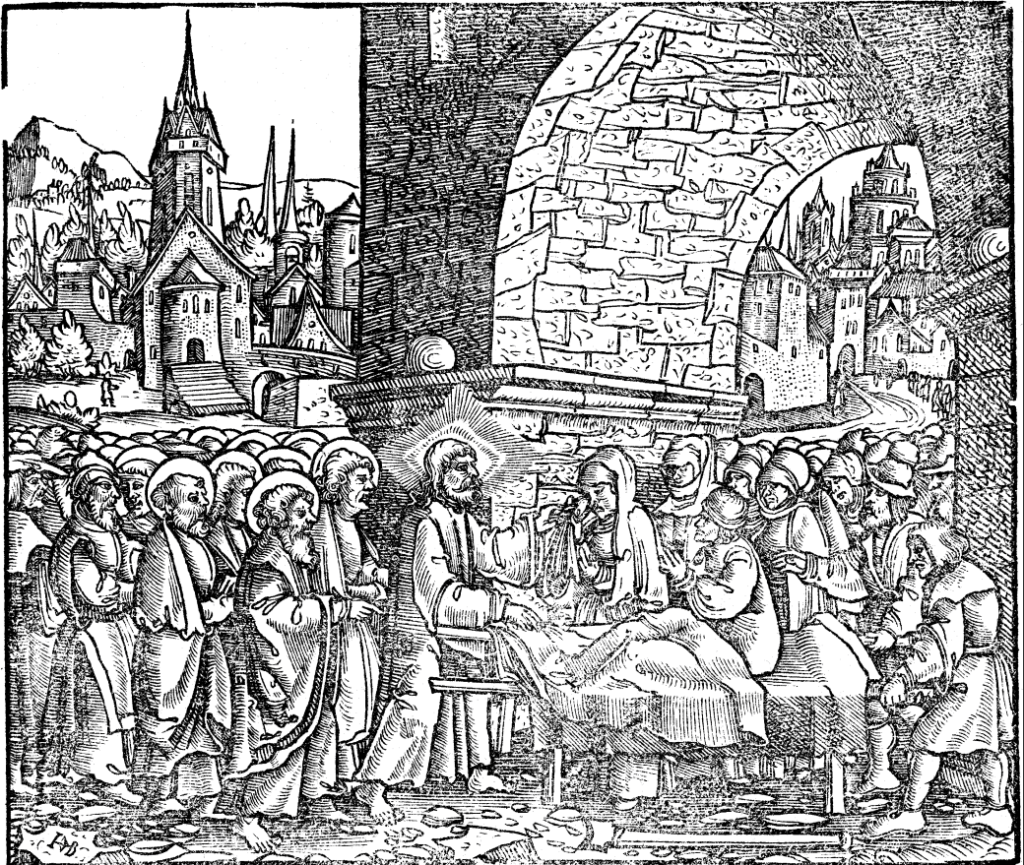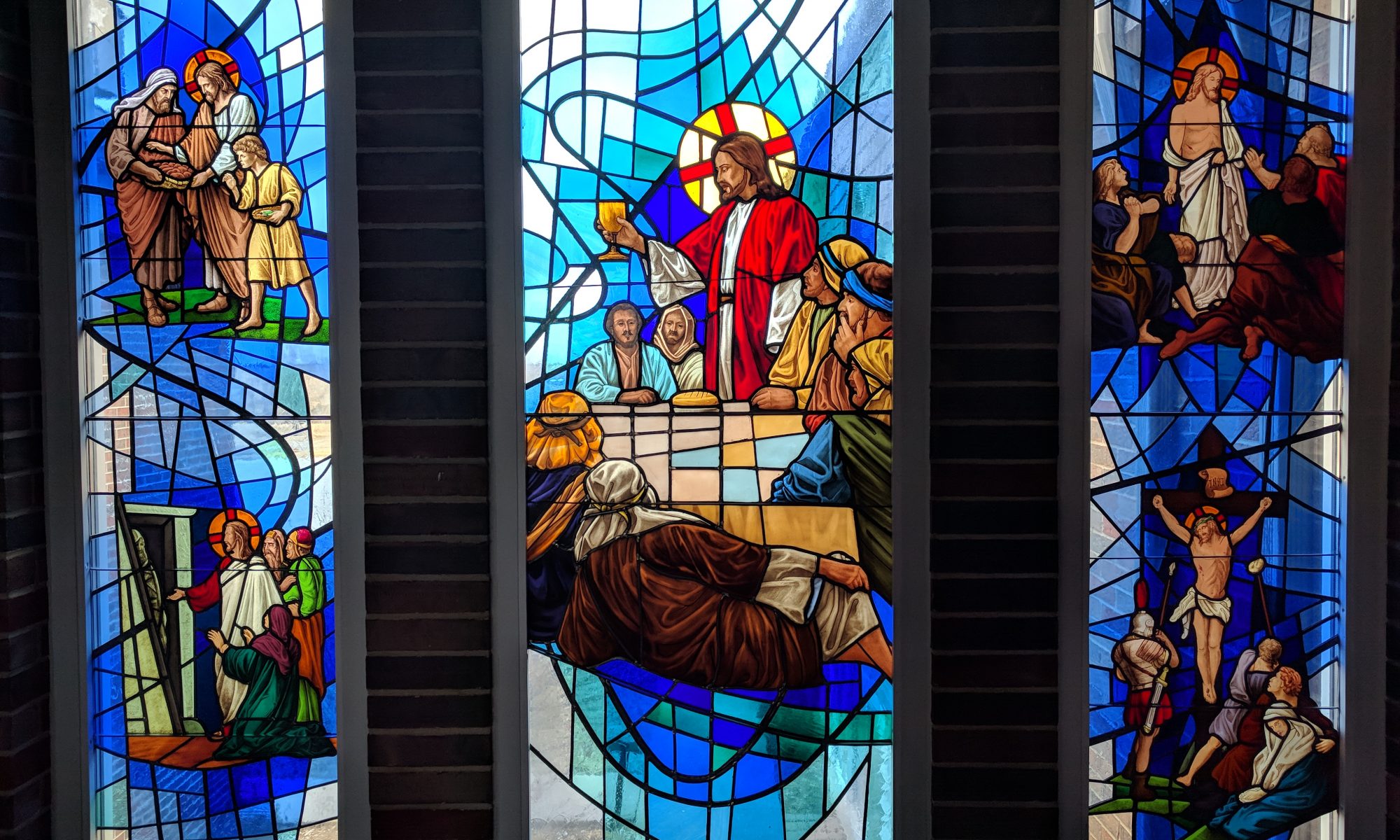
Lessons: 1 Kings 17:17-24, Ephesians 3:13-21, Luke 7:11-17
Hymns: LSB 849, 758, 633, 713, 573
Grace, mercy, and peace to you from God our Father and our Lord and Savior, Jesus Christ. Amen.
In today’s Gospel, Luke describes two processions. The first represents the Law. A woman is weeping. A large crowd is with her. She had already buried her husband. And now death knocked again. This time it was her son—her one and only son. It hardly seems fair when parents bury their children. When parents are forced to endure such affliction, they often think, “Why couldn’t I have died? Why did the Lord take him now?” But we cannot trade places with our loved ones, no matter how old the parent is or how young the child is. Even if we could trade places, the child would be left with more years of toil and trouble and heartbreakings here on earth (LSB 679).
The reason our world is filled with death and sorrow is due to sin. The Law declares, “the wages of sin is death” (Rom 6:23). If Adam and Eve would have listened to God and not Satan, and if no one would have eaten from the fruit of the tree of the knowledge of good and evil, then all mankind would still be living in the Garden of Eden. There would be no death. There would be no pain. There would be no suffering. There would be no weeping.
But we have all inherited the sin that was committed over 6,000 years ago. On top of inheriting this original sin, we are all guilty of sinning and falling short of the glory of God. God’s wrath must be carried out because God is Just and Holy. Since God is Holy, no one can come into His presence and live. No one can defile Him with their sin. No one can go to heaven without first having their sins wiped away. And since God is Just, divine justice must prevail. There’s no letting off the hook. Punishment for sin must take place. God cannot pardon sinners without first receiving a payment for our sin. The payment of innocent blood is the only one that satisfies God’s justice.
And so, God sent Jesus into the world. And Jesus is the reason for the second procession. This procession represents the Gospel. A crowd is following Jesus, listening intently to His preaching and witnessing His miracles. He proclaims a message of repentance and forgiveness.
But now Jesus suddenly does the unthinkable. In fact, there’s several things Jesus does that may seem wrong at first glance.
One thing Jesus does is He gets in the way and stops the procession. So let’s consider funeral processions for a moment. When Queen Elizabeth died, her body was moved to different places across the UK. Roads were blocked. Nothing was allowed to get in the way of any procession of the Queen. God Himself is not a respecter of persons. Whether it is the Queen of England or a lowly peasant, no one should get in the way of a funeral procession. If you meet a funeral procession, give them room and have compassion. If you are driving, pull over and wait. Don’t just pull to side and drive a little slower, but stop. Whatever you are racing to will probably be of little consequence after you die. So show some respect. Love those mourners whom you may not have met. Say a prayer for them as they grieve. Then continue your journey once the entire procession has gone by.
Because I usually ride in the hearse with the undertaker along with the body which we are about to lay in the grave, I often have a clear view of people’s reactions when they are met by a funeral coach. Many are respectful and stop. But some refuse to slow down. What’s the hurry? At least we have cell phones to explain why we’re late. Let’s not be caught rudely interrupting funeral processions!
When Jesus stops the funeral procession, He is not being rude or disrespectful. He comes with compassion, and He has an amazing plan to put His compassion into action. This gets us to the next thing that may be considered unthinkable. Jesus says to the grieving mother, “Do not weep.” Words like these are usually not helpful when people are grieving. Same with, “Aren’t you over it, yet?” Or “It’s time to move on.” Weeping is a God-given way to grieve. The separation caused by death is painful. There’s no reason to hide our grief. If we know we’re going to be a wreck by coming to church after a loved one has died, so be it. Let’s come to God’s House and shed tears. This is where we need to be, and this ought to be the place where we will be met with great compassion, for we are with our brothers and sisters in Christ.
When Jesus says, “Do not weep,” He isn’t giving some cold instruction by someone who doesn’t understand the pain of death. Instead, Jesus says these words because He is the Resurrection and the Life (John 11:25). He is about to raise the woman’s son from the dead.
But before He does so, Jesus does another unthinkable act. The people are mortified. He touches the bier, which is like a stretcher for carrying a body to the cemetery. Many translations call it an open coffin—one that does not get buried. In the Old Testament, the Ceremonial Law forbade people from coming into contact with dead bodies. Jesus fulfilled this Law, and we are no longer forbidden from touching the casket. It is ok to touch our loved one who has died.
Because the people were still observing Old Testament laws, Jesus would have shocked the people. They are speechless for touching the bier. What is He doing? How can He behave in this way?
And then He performs a most amazing act. By speaking a Word, He broke the dead silence, announcing, “Young man, I say to you, arise.” And the young man rises from the dead. He’s no longer asleep in death, but lives. Jesus performs a most glorious miracle, showing He is the Lord of Life—God Himself. While Elijah prayed to raise a boy from the dead, Jesus simply spoke, performing His Word.
Suddenly the crowd’s tears turn to fear. The people stand in awe. They had never seen anything like it before. And the woman rejoices for her only son is now alive. They glorify God. All praise to Him for His mighty deeds (Psalm 150:2)!
The people acknowledged that a great Prophet had risen up among them. But Jesus no ordinary prophet. Yet, Jesus was unlike the mortal prophets whom God raised up to preach the Word. Instead, Jesus is THE Prophet prophesied in Deuteronomy 18 and He is the seed of the woman who was promised by God in the Garden that Jesus would destroy Satan.
Even though Jesus has power over death and raised the dead, Christ our Lord came into this world to die. Divine justice was carried out on Christ. He died to atone for our sin. He died to pay the penalty that was due for us. He died to make a ransom. He died to fulfill God’s demands for a blood payment. Because Jesus is God, His works are infinite. His act of obedience by dying paid for the sins of all people. His act of obedience means all believers are credited with perfection.
Scarcely would one die for a righteous person, but here Christ dies for all unrighteous, all unworthy, all rebellious, and all hate-filled people. That is, Christ died for you and me. He died to redeem us from sin and to declare a verdict: “Not guilty!” He declares you to be free of sin—righteous and holy—His beloved children.
Just as the two processions represent the Law and Gospel, so also Law and Gospel meet at the cross of Christ. Divine Justice is upheld as Christ dies, bearing the world’s sin in His Body and suffering the wrath of God. And Divine Grace is upheld because Christ died making complete and perfect payment for all our sin.
Jesus broke the silence again by saying, “It is finished.” With these words, heaven is opened, death loses its sting, Satan is defeated, and our sins are atoned for. Then the Lord of Life died.
On the third day, the silence was again broken as the women went to the tomb of Jesus and found the stone blocking access to Jesus had been rolled away. A young man in a long robe said to these faithful women, “Do not be alarmed. You seek Jesus of Nazareth, who was crucified. He is risen! He is not here” (Mark 16:6). These women heard amazing words. It was hard for them to believe. They only wanted to serve Jesus by giving Him proper treatment for His burial. They came to serve Him by anointing Him with oil. They wanted to perform a simple act of charity in honor of a dead man. But now they discovered He was no longer dead! He is Risen!
Such great news we have in knowing our Savior can heal the sick, raise the dead, atone for our sin, rise from the dead, and even raise us up from the dead on the Last Day. Such great news to know that Jesus has paid the ransom that was needed, that He has declared you not guilty, and that He has gone to prepare a home for you!
Let us never bottle this great message up. Let us run quickly as the women did to tell the disciples and tell others, to proclaim it from the rooftops, for this is such great news. And let us support all faithful efforts to proclaim this Word, especially the work of our congregation. People cannot come to faith without hearing the Word.
For the Word of God brings to us the forgiveness of sins. With the forgiveness of sins comes the resurrection of the body and the life everlasting.
At the Last Day, Christ Jesus will speak again. He will raise everyone from the dead. He will give to all believers in Christ eternal life. We will soon have incorruptible and immortal bodies and will live with Christ Jesus and all believers in Christ forever. As Psalm 23 states, we will dwell in the house of the Lord forever.
“Now to him who is able to do far more abundantly than all that we ask or think, according to the power at work within us, to him be glory in the church and in Christ Jesus throughout all generations, forever and ever. Amen” (Eph 3:20-21).
The peace of God which passes all understanding keep your hearts and minds in Christ Jesus to life everlasting. Amen

